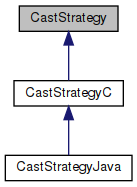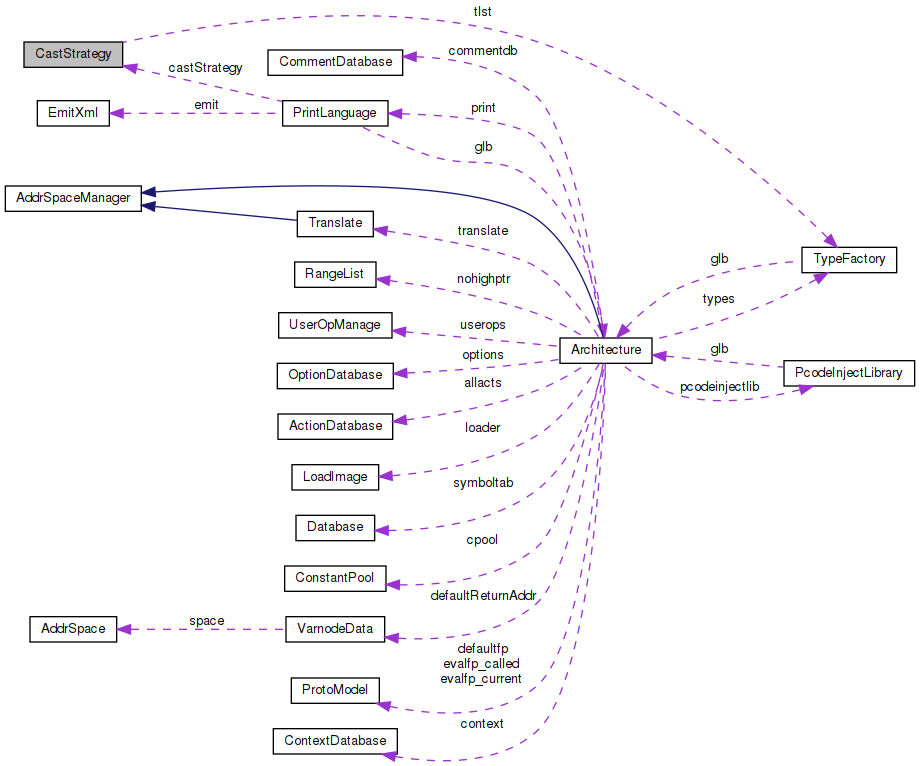A strategy for applying type casts. More...
#include <cast.hh>


Public Types | |
| enum | IntPromotionCode { NO_PROMOTION = -1, UNKNOWN_PROMOTION = 0, UNSIGNED_EXTENSION = 1, SIGNED_EXTENSION = 2, EITHER_EXTENSION = 3 } |
| Types of integer promotion. More... | |
Public Member Functions | |
| CastStrategy (void) | |
| Constructor. | |
| void | setTypeFactory (TypeFactory *t) |
| Establish the data-type factory. More... | |
| virtual | ~CastStrategy (void) |
| Destructor. | |
| virtual int4 | localExtensionType (const Varnode *vn) const =0 |
| Decide on integer promotion by examining just local properties of the given Varnode. More... | |
| virtual int4 | intPromotionType (const Varnode *vn) const =0 |
| Calculate the integer promotion code of a given Varnode. More... | |
| virtual bool | checkIntPromotionForCompare (const PcodeOp *op, int4 slot) const =0 |
| Check if integer promotion forces a cast for the given comparison op and slot. More... | |
| virtual bool | checkIntPromotionForExtension (const PcodeOp *op) const =0 |
| Check if integer promotion forces a cast for the input to the given extension. More... | |
| virtual bool | isExtensionCastImplied (const PcodeOp *op, const PcodeOp *readOp) const =0 |
| Is the given ZEXT/SEXT cast implied by the expression its in? More... | |
| virtual Datatype * | castStandard (Datatype *reqtype, Datatype *curtype, bool care_uint_int, bool care_ptr_uint) const =0 |
| Does there need to be a visible cast between the given data-types. More... | |
| virtual Datatype * | arithmeticOutputStandard (const PcodeOp *op)=0 |
| What is the output data-type produced by the given integer arithmetic operation. More... | |
| virtual bool | isSubpieceCast (Datatype *outtype, Datatype *intype, uint4 offset) const =0 |
| Is truncating an input data-type, producing an output data-type, considered a cast. More... | |
| virtual bool | isSubpieceCastEndian (Datatype *outtype, Datatype *intype, uint4 offset, bool isbigend) const =0 |
| Is the given data-type truncation considered a cast, given endianess concerns. More... | |
| virtual bool | isSextCast (Datatype *outtype, Datatype *intype) const =0 |
| Is sign-extending an input data-type, producing an output data-type, considered a cast. More... | |
| virtual bool | isZextCast (Datatype *outtype, Datatype *intype) const =0 |
| Is zero-extending an input data-type, producing an output data-type, considered a cast. More... | |
Protected Attributes | |
| TypeFactory * | tlst |
| Type factory associated with the Architecture. | |
| int4 | promoteSize |
| Size of int data-type, (size that integers get promoted to) | |
Detailed Description
A strategy for applying type casts.
A cast operation in C or other languages masks a variety of possible low-level conversions, such as extensions, truncations, integer to floating-point, etc. On top of this, languages allow many of these types of operations to be implied in the source code, with no explicit token representing the conversion. Conversions happen automatically for things like integer promotion, between different sizes (of integers), and between signed and unsigned data-type variants.
This class is the API for making four kinds of decisions:
- Do we need a cast operator for a given assignment
- Does the given conversion operation need to be represented as a cast
- Does the given extension or comparison match with the expected level of integer promotion
- What data-type is produced by a particular integer arithmetic operation
Member Enumeration Documentation
◆ IntPromotionCode
Types of integer promotion.
For many languages, small integers are automatically promoted to a standard size. The decompiler describes how an expression is or will be affected by integer promotion, using these codes
Member Function Documentation
◆ arithmeticOutputStandard()
What is the output data-type produced by the given integer arithmetic operation.
- Parameters
-
op is the given operation
- Returns
- the output data-type
Implemented in CastStrategyC.
◆ castStandard()
|
pure virtual |
Does there need to be a visible cast between the given data-types.
The cast is from a current data-type to an expected data-type. NULL is returned if no cast is required, otherwise the data-type to cast to (usually the expected data-type) is returned.
- Parameters
-
reqtype is the expected data-type curtype is the current data-type care_uint_int is true if we care about a change in signedness care_ptr_uint is true if we care about conversions between pointers and unsigned values
- Returns
- NULL to indicate no cast, or the data-type to cast to
Implemented in CastStrategyJava, and CastStrategyC.
◆ checkIntPromotionForCompare()
|
pure virtual |
Check if integer promotion forces a cast for the given comparison op and slot.
Compute to what level the given slot has seen integer promotion and if a cast is required before the comparison operator makes sense.
- Parameters
-
op is the given comparison operator slot is the input slot being tested
- Returns
- true if a cast is required before comparing
Implemented in CastStrategyC.
◆ checkIntPromotionForExtension()
|
pure virtual |
Check if integer promotion forces a cast for the input to the given extension.
Compute to what level the given slot has seen integer promotion and if a cast is required before the extension operator makes sense.
- Parameters
-
op is the given extension operator INT_ZEXT or INT_SEXT
- Returns
- true if a cast is required before extending
Implemented in CastStrategyC.
◆ intPromotionType()
|
pure virtual |
Calculate the integer promotion code of a given Varnode.
Recursively examine the expression defining the Varnode as necessary
- Parameters
-
vn is the given Varnode
- Returns
- the IntPromotionCode
Implemented in CastStrategyC.
◆ isExtensionCastImplied()
|
pure virtual |
Is the given ZEXT/SEXT cast implied by the expression its in?
We've already determined that the given ZEXT or SEXT op can be viewed as a natural cast operation. Determine if the cast is implied by the expression its and doesn't need to be printed.
- Parameters
-
op is the given ZEXT or SEXT PcodeOp readOp is the PcodeOp consuming the output of the extensions (or null)
- Returns
- true if the op as a cast does not need to be printed
Implemented in CastStrategyC.
◆ isSextCast()
Is sign-extending an input data-type, producing an output data-type, considered a cast.
Data-types must be provided from the input and output of an INT_SEXT operation.
- Parameters
-
outtype is the output data-type intype is the input data-type
- Returns
- true if the INT_SEXT should be represented as a cast
Implemented in CastStrategyC.
◆ isSubpieceCast()
|
pure virtual |
Is truncating an input data-type, producing an output data-type, considered a cast.
Data-types must be provided from the input and output of a SUBPIECE operation.
- Parameters
-
outtype is the output data-type intype is the input data-type offset is number of bytes truncated by the SUBPIECE
- Returns
- true if the SUBPIECE should be represented as a cast
Implemented in CastStrategyC.
◆ isSubpieceCastEndian()
|
pure virtual |
Is the given data-type truncation considered a cast, given endianess concerns.
This is equivalent to isSubpieceCast() but where the truncation is accomplished by pulling bytes directly out of memory. We assume the input data-type is layed down in memory, and we pull the output value starting at a given byte offset.
- Parameters
-
outtype is the output data-type intype is the input data-type offset is the given byte offset (into the input memory) isbigend is true if the address space holding the memory is big endian.
- Returns
- true if the truncation should be represented as a cast
Implemented in CastStrategyC.
◆ isZextCast()
Is zero-extending an input data-type, producing an output data-type, considered a cast.
Data-types must be provided from the input and output of an INT_ZEXT operation.
- Parameters
-
outtype is the output data-type intype is the input data-type
- Returns
- true if the INT_ZEXT should be represented as a cast
Implemented in CastStrategyJava, and CastStrategyC.
◆ localExtensionType()
|
pure virtual |
Decide on integer promotion by examining just local properties of the given Varnode.
- Parameters
-
vn is the given Varnode
- Returns
- an IntPromotionCode (excluding NO_PROMOTION)
Implemented in CastStrategyC.
◆ setTypeFactory()
| void CastStrategy::setTypeFactory | ( | TypeFactory * | t | ) |
Establish the data-type factory.
Sets the TypeFactory used to produce data-types for the arithmeticOutputStandard() method
- Parameters
-
t is the TypeFactory
The documentation for this class was generated from the following files:
- cast.hh
- cast.cc
 1.8.13
1.8.13